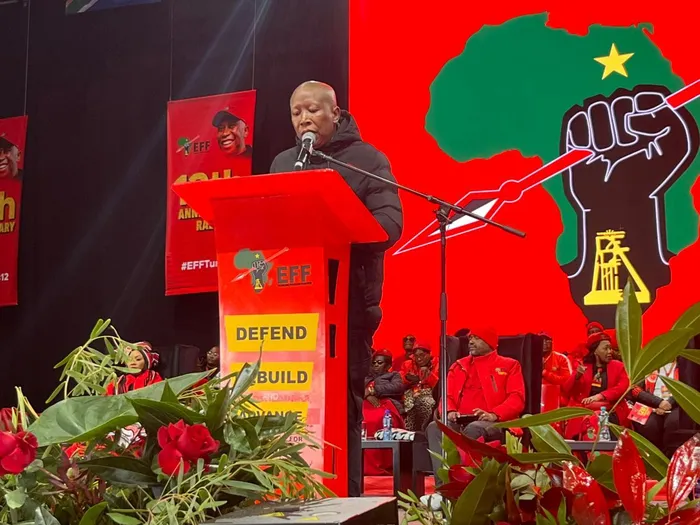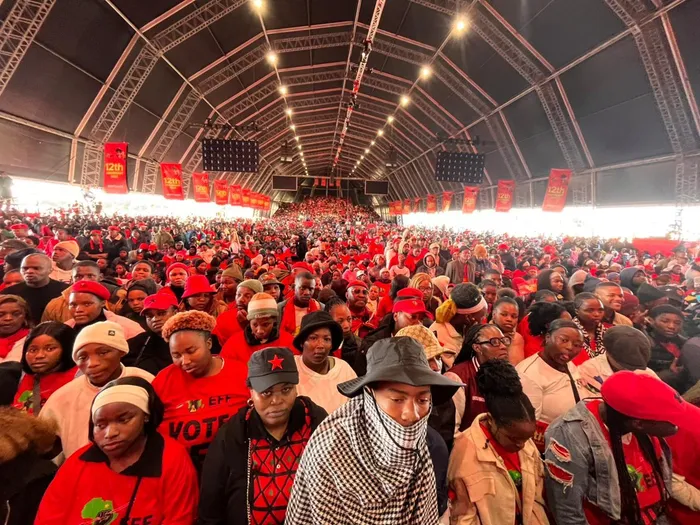
Economic Freedom Fighters founder and president Julius Malema gives his speech at the party's 12th anniversary celebrations in Khayelitsha.
Image: Mandilakhe Tshwete
Twelve years ago, the Economic Freedom Fighters (EFF) burst onto South Africa’s political landscape with a promise to transform the country’s economic and social order.
Founded by Julius Malema and his comrades on July 26, 2013, the party emerged from a deep frustration with the slow pace of change since democracy and the persistence of poverty, inequality, and racial divisions.
Their rallying cry was clear: radical economic transformation, land expropriation without compensation, nationalisation of mines and banks, and the eradication of poverty.
Speaking at the EFF’s 12th anniversary celebrations, Malema painted a vivid picture of how those founding principles remain as urgent today as ever.
He reminded the crowd of Khayelitsha’s history, founded in 1983 under apartheid as a relocation site for Black people forcibly removed from Cape Town.
Despite decades of democracy, Khayelitsha still bears the scars of spatial apartheid: poor infrastructure, inadequate housing, unreliable water, and limited public transport.

Thousands of supporters filled the dome, which holds 10,000 people, demonstrating the massive turnout for the EFF’s 12th anniversary celebrations.
Image: Mandilakhe Tshwete
For many residents, these conditions have become normalised.
Malema did not hold back in his criticism of the DA, the party governing the Western Cape.
He accused the DA of protecting white privilege and sustaining inequality by neglecting townships like Khayelitsha.
While affluent suburbs such as Constantia and Clifton enjoy well-maintained roads and services, places like Gugulethu and Nyanga continue to suffer from neglect, overcrowded clinics, and dangerous streets plagued by gang violence.
He added that the DA’s failure to extend services such as the MyCiTi bus into these areas was deliberate exclusion.
“Spatial apartheid continues under their watch,” Malema said.
The party, he claimed, has no genuine interest in addressing poverty or unemployment, problems that affect over 43% of South Africans and hit the youth hardest.
Malema also spoke about the broader economic challenges facing the country, saying that while other nations on the continent experience growth, South Africa’s economy is stagnating.
He criticised the control that white-owned banks and financial institutions hold over the economy, dictating who can access loans and property, and keeping wealth concentrated in the hands of a few.
"At the same time, key state-owned enterprises are being weakened by defunding and attempts to privatise through outsourcing or fragmenting services."
He pointed to the gradual dismantling of institutions like Eskom and Transnet, warning that the consequences are dire for the country’s development and job creation.
The looming debt crisis, with government spending over R420 billion this year just on interest payments, was described as a ticking time bomb that threatens social services such as education, health, and policing.
To counter this, the EFF plans to push for laws requiring parliamentary approval of loans from the International Monetary Fund and World Bank.
The party rejects neoliberal economic policies imposed by these institutions, arguing instead for a state-led developmental model focused on industrialisation and wealth redistribution.
Malema stressed that the party has remained true to its revolutionary principles, refusing to become co-opted by establishment politics or elite interests.
The EFF’s activism spans beyond Parliament, engaging directly with communities through land occupations, supporting workers’ rights, and fighting gender-based violence.
However, the party’s growing influence has unsettled the political establishment.
Malema recounted how even international figures have taken notice, including a visit to the White House where former US President Donald Trump played EFF songs 'Kill the boer' as a warning, which he repeatedly sang after concluding his speech.
He criticised both the ANC and DA for forming uneasy coalitions motivated by fear of the EFF’s growing power.
In a pointed attack, Malema said the ANC has become riddled with corruption and tenderpreneurship, while the DA serves to protect white monopoly capital.
Yet, both parties are united in their efforts to block the EFF from gaining control in any government.
On crime and policing, the EFF expressed support for Lieutenant General Nhlanhla Mkhwanazi, who raised allegations of corruption and criminal syndicates operating within law enforcement.
The party insisted on a parliamentary committee to investigate these claims, emphasising the need to clean up police and justice institutions.
Looking to the future, the EFF is preparing for the 2026 local government elections with ambitions to govern outright in many municipalities.
Malema urged party structures to strengthen grassroots organisation, win wards decisively, and deliver services that the DA has failed to provide. Ending poverty, combatting crime, and ensuring dignity for all remain the movement’s key objectives.
Cape Times
Related Topics: